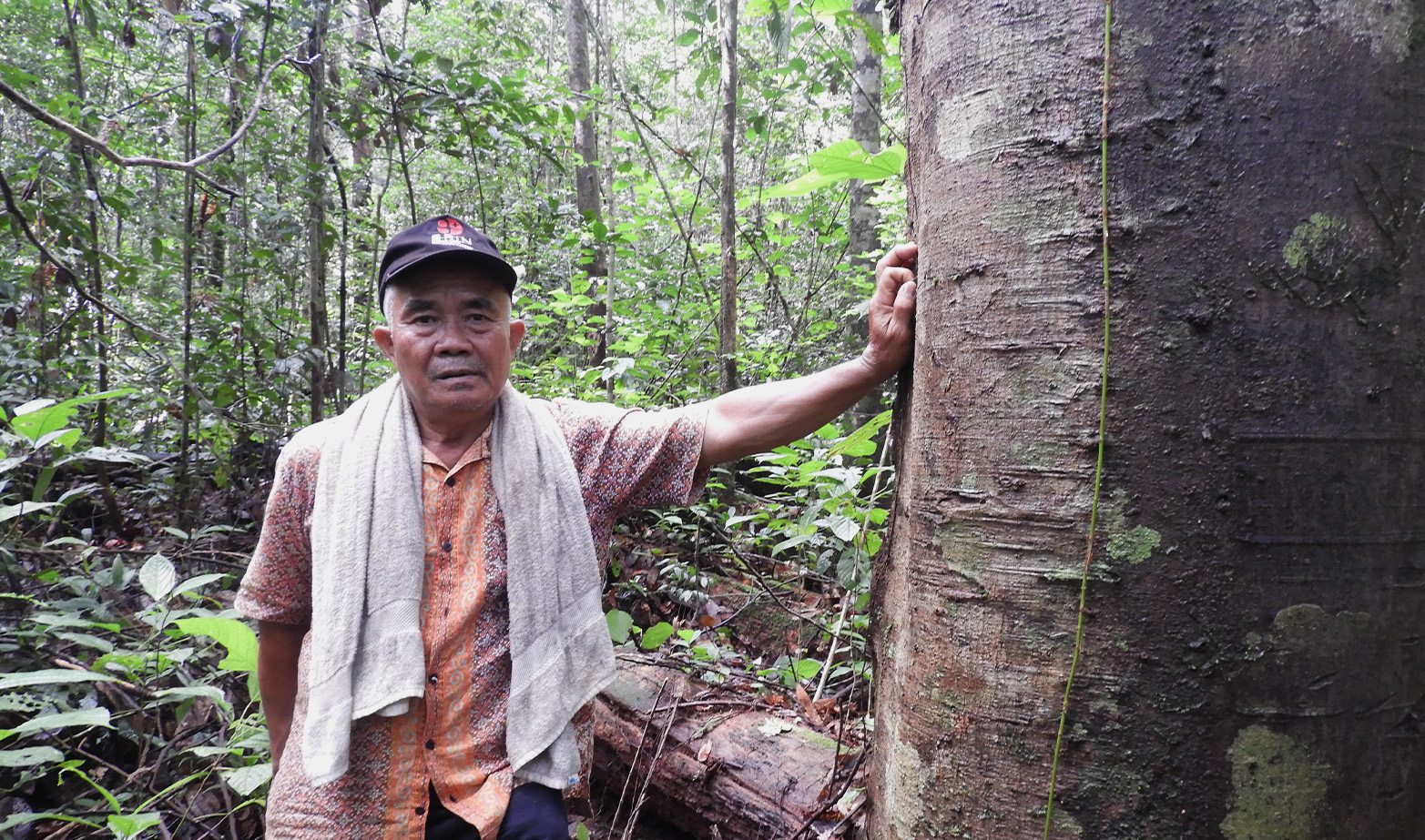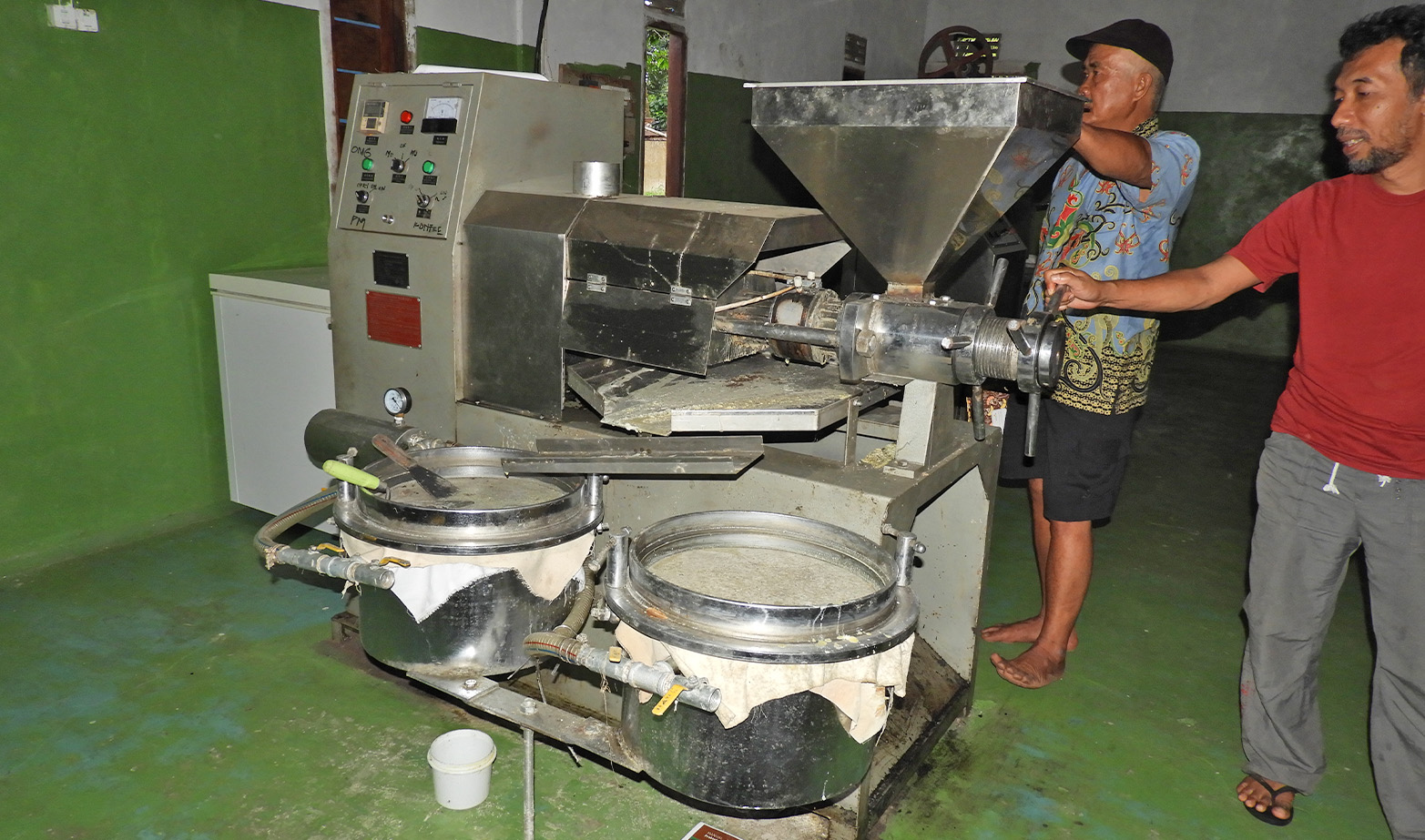
Damianus Nadu in the Pangajid-Pikul customary forest, Desa Sahan. (P.Wood/Samdhana)
- admin
- 25 September 2025
- Analysis
From subsistence to market: the ups and downs of revitalising a forest product trade chain
Tengkawang, or Ilipe nut, refers to six species of tropical trees in the genus Shorea, all of which are endemic to Kalimatan. These species belong to the large and commercially valuable dipterocarp family, which dominate Southeast Asia’s lowland forests. However, tengkawang trees are not only valuable for their timber. The heavy, winged seeds produce a fatty oil rich in antioxidants and omega-3,- 6 and -9, and can be used for cosmetics, medicines and in food.
Tengkawang is part of the traditional subsistence economy of many Dayak communities. During the rainy season, the fallen nuts are collected from the forest floor. They are then shelled, dried, ground, steamed, and then squeezed between two large blocks of wood to extract the oil. At room temperature, the oil congeals into a yellow, buttery substance that can be stored for many months sealed inside lengths of bamboo. Tengkawang butter can be used in cooking, as a skin cream, and in traditional rituals.
Historically, tengkawang from West Kalimantan was exported to Europe and other markets. Until 2012, there were three buyers in Pontianak who purchased raw nuts for export, and a local factory did some initial processing before also exporting the product. However, in 2012, the Indonesian government banned the export of many unprocessed products, including tengkawang, to promote domestic industry. At a stroke, the market for tengkawang collapsed. By 2016, the factory in Pontianak, owned by the company Wilmar, had shifted to processing palm oil. Unable to secure a decent price for the nuts, most villagers stopped collecting them except for their personal use. In many places, tengkawang trees were felled, to cash in on the valuable timber.
In 2011, staff from the Pontianak-bsed NGO INTAN visited Sahan Village in Bengkayang district as part of an investigation into illegal logging. Coincidentally, the community was carrying out a ritual, which included the use of traditionally produced tengkawang butter. Their curiosity piqued, INTAN investigated the history and use of tengkawang. Discussions with the villagers opened the possibility of revitalizing tengkawang collection and production as a means of forest conservation and economic empowerment.
The first challenge was to improve the traditional oil extraction method, which was labor-intensive and inefficient. Traditionally, large blocks of wood are hammered into a frame, squeezing oil from the tengkawang flour which is wrapped in a cloth. INTAN and interested community members created a ‘learning centre’ in the village with a simple manual press, designed at the University of Tanjung Pura in Pontianak. The machines reduced the manual effort needed and increased oil yield.
The production of tengkawang oil and butter in Sahan attracted the interest of potential buyers from within Indonesia and beyond. However, concerns about product consistency and supply reliability prevented deals from progressing beyond the sample stage. Nevertheless, this interest showed the potential market, if these problems could be overcome.
In an effort to increase the volume and quality of the butter, INTAN and the community raised funds and built a small factory in the village. It consists of a drying floor, a storage area with capacity for 20 tonnes of nuts, a processing room, and a room for storing the packaged butter. In August 2022, two electric processing machines were purchased, capable of grinding, steaming, and extracting oil in one integrated process. Just as important as the building and the machinery, INTAN and the cooperative developed a standard operating procedure to guarantee the purity and quality of the butter. Packaging was designed, and INTAN established a small ‘tengkawang café’ in the University in Pontianak as a place to test recipes and promote the product.
Skills and Technical Challenges
For the enterprise to succeed, strong governance was essential. With support from INTAN, the community created an organizational structure that kept local control over the business. When the village’s customary forest was legally recognised by the national government, the villagers formed several social forestry enterprise groups (Kelompok usaha perhutanan sosial, KUPS): a general group for community members concerned with managing tengkawang in the customary forest, a women’s group focused on tengkawang-based food products, two groups (mainly for youth) focused on agroforesty and tree nursery development, and an eco-tourism group. These groups functioned as forums for decision-making and collaborations within the village. However, KUPS, created under the auspices of the Ministry of Environment and Forestry, are not legally recognized entities by many government agencies. This meant that the KUPS were not able to apply for permits for food production, marketing or the operation of the factory. To overcome the problem, the community created a legally registered cooperative.

Running a processing business required new skills – and often a new mindset – different from those normally required in a predominantly agricultural village. Training on business planning, and involving young people familiar with computers, have helped the group to adapt and learn. There have also been technical challenges. The simple machines first used to squeeze the oil from tengkawang flour turned out to be vulnerable to bending under excessive pressure. The more sophisticated machines installed in 2022 required a stable electricity supply, and more importantly, a technician with electrical and mechanical skills. The Forest Wise factory in Sintang district, the only other facility operating these machines in West Kalimantan, had helped the community. But the lack of a local technician available on call meant that they are vulnerable to technical problems when processing.
Seasonal Supply and Storage Issues
Tengkawang nuts are seasonal. In most villages, the trees only bear fruit once every four years. In Desa Sahan, however, perhaps because of the fertile volcanic soil, the tengkawang trees fruit annually. Nevertheless, the fruiting season is limited to three months in the rainy season. During these months – and especially when the mass fruiting happens across the region – the forest and community gardens (tembawang) produce tonnes of nuts. The rest of the year, and outside mass-fruiting year, there is none. Ensuring a regular supply of tengkawang butter when the supply of raw materials is so seasonal is a challenge. INTAN and the community experimented with storing at different stages in the production cycle. The best results came from storing the nuts at the beginning of the process – dried but not yet shelled – or at the end, when it has been converted to butter. They can last several months, perhaps over a year, potentially ensuring the supply for factory and market. Storing the tengkawang during the intermediate stage is more difficult. Once it is shelled, long-term storage results in chemical changes which affect the quality of the final product.
Financing the Business
Another challenge is the financing of the process. Without certification and a clear market, the business has not been able to secure capital investment, but has been depending on grants from donors. Without funds, the cooperative cannot buy all the tengkawang nuts from a large harvest season.
As INTAN explored the potential of the rapidly growing food oil market in Indonesia, they learned that no national standard (Standar Nasional Indonesia, SNI) existed for tengkawang. Without a national standard, there was no basis for the Medicines and Food Supervisory Agency (Badan Pengawas Obat dan Makanan, BPOM) to evaluate the process and product, and issue the certificate of food quality and hygiene. Without a BPOM certificate, a food product cannot be sold in Indonesia.
Securing an SNI for tengkawang took 4 years. Ironically, consumer countries such as India, USA and the European Union already have standards for tengkawang, while Indonesia was yet to establish one. INTAN reviewed the standards used elsewhere, worked with government, and eventually an Indonesian standard was adopted in 2024. It marked a critical milestone in the effort to shift tengkawang from a half-forgotten, subsistence product to a high-value food oil. INTAN’s work means a standard now exists which can be applied to tengkawang produced by any community in Indonesia wishing to enter the domestic food market.
With the chemical content of the butter produced in Sahan village verified against the national standard, the next step for INTAN is BPOM certification. Helped by visits from BPOM staff, they identified areas where improvements were needed – primarily on the layout and specifications of the drying floor and processing plant to ensure hygienic and efficient production and packaging. As of August 2025, INTAN and the group received a Business License for Supporting Business Activities (PB UMKU) with the number 190822005805100020001. This license was issued by the Food and Drug Supervisory Agency or Badan Pengawas Obat dan Makanan Republik Indonesia (BPOM RI), following an audit visit by BPOM staff in 2024.
This certificate will help the tengkawang processing business more promising and sustainable. Key technical issues have been resolved. The legal framework is in place. The market is clear and several important buyers have shown interest. The community has the goodwill and support of INTAN, the local government, the KPH, Forest Wise and others. Taking the final steps to become a sustainable, profitable business means overcoming the remaining inter-related challenges: villagers will not take time off from their farm work to collect tengkawang nuts if the cooperative does not have the funds to buy them; the skills needed to maintain the machines and run the business will not be developed unless the cooperative can pay for the workers to train; and the cooperative and buyers do not have the confidence to sign contracts without assurance of the supply of nuts and the ability to process them. INTAN and the community are considering where they can secure the funding they need to address these issues. Possibilities include a village government or village enterprise body (Badan Usaha Milik Desa, Bumdes) or corporate social responsibility (CSR) funding from a potential buyer such as Wilmar.
The tengkawang journey is connected to a wider story about rural livelihoods and depopulation in rural villages of West Kalimantan. Although there is no shortage of land in Sahan, both today’s generation of parents and the youth recognise that aspirations are changing, and fewer people want to manage land in the way their parents did. Small-scale, community-run businesses such as the tengkawang factory could be part of the solution.